Copyright ©2007 PopEntertainment.com. All rights reserved.
Posted:
September 9, 2007.
The
world at large has never quite caught on to
Chantal Kreviazukís name Ė and the world is a lesser place for it.
In
a perfect world, everyone would know about Kreviazuk. She certainly has
spent enough of the past decade introducing herself.
She is a star in her native Canada, garnering several hit
singles, four smash albums and Juno Awards (the Canuck equivalent of the
Grammys) north of the Border. In fact her latest Ė and arguably best CD Ė
Ghost Stories, was her best-selling disk yet at home.
Kreviazuk was given the next-big-thing hype ride in the
States in the late 90s with the release of her debut CD Under These Rocks
and Stones. While it was released to critical acclaim and moderately
good sales, it never quite reached the level of frenzy that her label
expected. She quickly became a prestige artist for Columbia Records Ė
someone who they expected to release artistically
rewarding albums, but who they never really pushed for greater things.
She is half of one of Canadian rockís biggest power couples.
Husband Raine Maida is lead singer and songwriter for rock band Our Lady
Peace Ė best remembered in the US for the 2001 smash hit ďSomebodyís Out
There.Ē Maida also produced her latest CD.
Kreviazuk and Maida have become in-demand songwriters for
hire, writing or co-writing hits for the likes of Kelly Clarkson (ďWalk
AwayĒ), Gwen Stefani (ďRich GirlĒ), Cheyenne Kimball (ďHolding OnĒ), Mandy
Moore (ďGardeniaĒ) and Avril Lavigne (six songs on Lavigneís Under My
Skin album.)
However, despite the fact that she is well-known for her
songwriting skills, in the States the closest Kreviazuk has ever come to
having hits as an artist were cover versions of othersí songs from movie
soundtracks Ė John Denverís ďLeaving On a Jet PlaneĒ from the movie
Armageddon and Randy Newmanís ďFeels Like HomeĒ from the TV series
Dawsonís Creek.
In recent years, Kreviazuk has been reprioritizing, placing
her family life ahead of her career. She and Raina have also been extremely
active in charity Ė giving her time as well as money for worthy causes like
the Warchild charity.
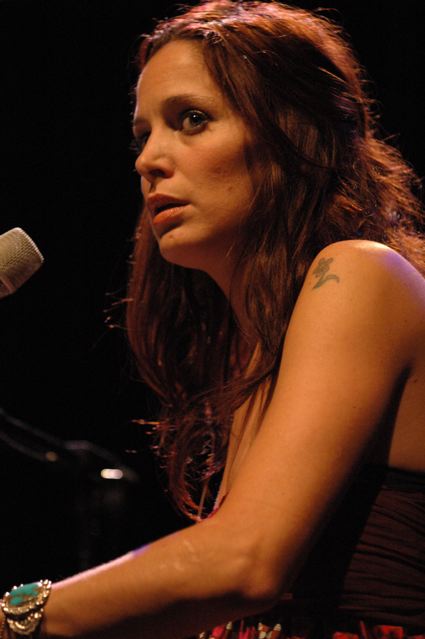 This newfound sense of purpose has led to what may well be
her defining statement as an artist. Ghost Stories is a gorgeous
song-suite documenting where Kreviazukís life is in 2007.
This newfound sense of purpose has led to what may well be
her defining statement as an artist. Ghost Stories is a gorgeous
song-suite documenting where Kreviazukís life is in 2007.
She will always consider Canada home, though she has long ago
left the Great White North for the sunny climes of Southern California. ďI
donít know if I could move back to Canada, because Iím just not into wearing
a closed-toe shoe anymore.Ē Kreviazuk
laughed during a recent phone interview.
So sheís a respected singer, songwriter, philanthropist,
loving wife and mother, occasional actressÖ Who needs stardom?
Kreviazuk recently gave us a call to discuss her career and
her latest CD.
You
were a classical piano prodigy as a little girl. How did you originally get
into music?
More
and more as I get older I see exactly what happened. I had such an eclectic
influence of music. I was into the classical music that I was studying and
I was into gospel music Ė that my mother would listen to or that I would
hear at church. I had my cousin corrupting me and teaching me every bit of
the 60s rock and roll era. Iím really fortunate to have had such a broad
influence in my life. Itís been really cool to grow up and see now where
thatís all coming from. I was just telling another interviewer that people
used to say, ďHave you listened to Carole King? Did you listen to Laura
Nyro?Ē And I would be like, uhh, noÖ
(laughs)
I mean, Carole King, I would have probably known a few of her songs Ė how
they were covered, but I had never listened to
Tapestry
until I was quite a bit older. I donít know
how, but I only got into Joni Mitchell when I was quite a bit older as
well. Itís interesting now when I hear how my music sounds Ė itís coming
from a lot of rock meets gospel. This album, for me, Iím quite proud of.
Itís quite a bit moreÖ the gospel is really prevalent. Itís very gospelly.
Thatís kind of cool.
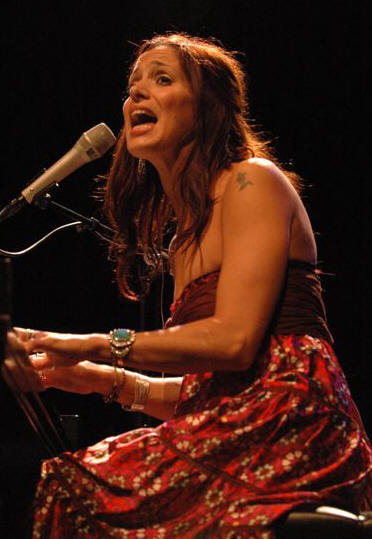 When you released
Under These Rocks and
Stones,
Sony was giving you a pretty big push. ďGod Made MeĒ ended up becoming a
minor hit. What was it like at the time, being a new artist who was primed
to break? And looking back, were you ready for it?
When you released
Under These Rocks and
Stones,
Sony was giving you a pretty big push. ďGod Made MeĒ ended up becoming a
minor hit. What was it like at the time, being a new artist who was primed
to break? And looking back, were you ready for it?
(laughs)
I canít
believe youíre asking me this, too.
I was just talking to somebody about this. Itís so funny. Itís so awesome
youíre asking me, because I just for the first time got my head around kind
of the chronological order of some things. Itís kind of funny, when I first
got signed and there was so much hype and they sent me around the world and
they really propped me up, and really set me up for a lot of disappointment,
thatís for sure. I was getting the attention of every record company
president under the Sony umbrella. I was being just totally heralded; sheís
a prodigy and sheís the next big thing Ė blah, blah, blah, blah. But you
see, I was signed out of Canada. So ultimately, the 50 cents on a dollar
was not going to really cut it for everyone. So everyone was sort of
waiting and looking to how America would Ė what they would do with me. If
they broke me in America, well, then, they would definitely follow suit.
But America decided that they werenít going to break me. So, it became a
thing of everyone else dropping the ball as well. Then I was back to my
Canadian career Ė where ultimately I was going to be the most celebrated for
my life, anyway. If anything lands on, Canada was going to be the place
where they would always receive me and be the mostÖ
Well,
you got a couple of Junos for
Colour, Moving and
Still,
right?
Yeah, for
Colour.
But then, I mean Ė the fourth album
(Ghost Stories),
I donít even know if I was nominated for [anything.] They didnít give me
any awards, but it was my biggest record. This would have been my album Ė
without downloading Ė that would have sold half a million records in
Canada. Itís so weird. I think the point of what Iím saying was that
ultimately, the life that my music took on is interesting. I feel the most
myself and organic and true to myself in Canada. Itís just, I donít know, I
canít explain it, but itís my home country, you know what I mean? Thereís
such an honor to being embraced by your own country. And thatís the country
where my music has a very popular presence. Here in America, Iíve done
amazing with my licensing. Thereís all sorts of wonderful things happening
all the time, but the Canadian thing that happens Ė itís just so fitting to
me, because itís allowed me to go full circle and just be who I am and never
end up getting manufactured and never worrying about being on top of the
next sound or having to keep up with anyone. I stopped that expectation a
long time ago. I dropped it. I make my albums at home with my husband
now. Iím just not that girl.
I saw
you in Philadelphia recently opening for Five for Fighting, and I loved some
of the stories you were telling about how things have changed for you as a
singer over the years. Now that you are married and have children, how have
your musical aspirations changed?
Well, I think that theyíve just become more real. Now
theyíre not about gettingÖ I donít knowÖ I donít have to worry about being
Ė I donít have to be hip.
(laughs) I get to be myself. When Iím making albums;
Iím kind of digging into the deepest place that I can find. Iím just
challenging myself as a poet and as a person. I donít know if Iíd like the
place that Iíd have to go if I was stuck in trying to keep up with being the
next big thing.
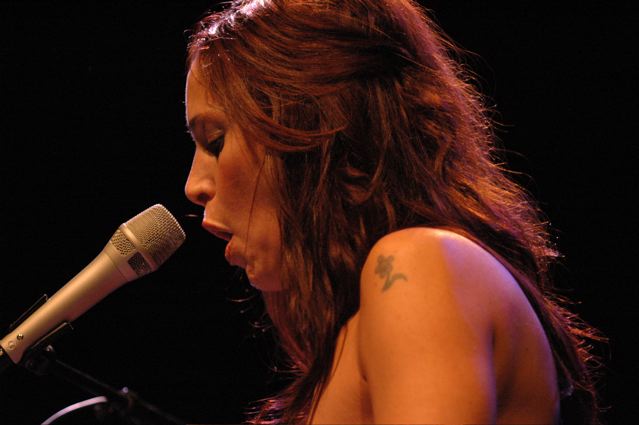 You
and Raine spent some time in Iraq working on the Warchild charity. I
interviewed Steve Mazur [Maidaís Our Lady Peace bandmate] a couple of years
ago and he said he felt that experience in some ways changed the direction
and politics of the last Our Lady Peace CD. Do you feel that the experience
also can be felt in
Ghost Stories?
You
and Raine spent some time in Iraq working on the Warchild charity. I
interviewed Steve Mazur [Maidaís Our Lady Peace bandmate] a couple of years
ago and he said he felt that experience in some ways changed the direction
and politics of the last Our Lady Peace CD. Do you feel that the experience
also can be felt in
Ghost Stories?
You know, my work with Warchild has also never stopped. Iím
in Ethiopia with them next month Ė where 25% of the worldís children living
with AIDS are. Iíve built with my husband; weíre on our second school right
now in Northeast Congo. Schools that will be serving about 400 children
each. Schools that were bombed out during the war. There are so many
programs to take part in through Warchild. Itís going to Iraq. Itís Raineís trip to Darfur. Itís me gearing up for this next trip. The
concerts that I put on. Iím working with poor kids in the native
communities of Winnepeg, Manitoba. Iím always doing so much stuff,
improving the quality of life for children who are part of a conflict Ė be
that of politics, be that of history, be that of war. Those things are
always at the forefront of my creativity. They are at the forefront of my
actions Ė as an artist and as a person. Those things are all-encompassing.
You donít turn them off when you go into the studio. You donít turn them
off while youíre writing. Itís just a part of who you are.
Well,
speaking of Iraq Ė and I may be reading too much into this because itís
never explicitly said Ė but I had the feeling that to a certain extent ďAll
I Can DoĒ was at least partially about the war. Was I reading too much into
that?
Well when you have kids, you start thinking, ďOh, shit, what
if my kid put on a uniform and went to war?Ē Thatís a very scary thought.
But it is possible. I thought I knew what love was, but it tends to change
when you have a baby. Itís so powerful. I donít think anything could have
prepared me for it. I donít want to be a controlling parent. Iím
overwhelmed by the thought of letting my kids do what they are going to do
and screw up Ė and just be there. But thatís the way it has to be. I can
only protect them so much. In actual fact, thatís what the song is about,
knowing that I can only do so much for my kids.
I
believe you said in concert that ďWonderfulĒ was a song that you wrote for a
friend. How did that song come about?
ďWonderfulĒ
is just aboutÖ there are so many people that are messed up about meeting
someone now. Everybodyís expectations have become so bizarre from the
media. Iím just seeing a lot of people who are just great people the way
they are. They donít need to be anything else except sweet and kind and
wonderful. I just feel like they are all Ė I donít know what people are
holding out for. Itís just bizarre. Iím seeing a lot of alone people that
shouldnít be alone. Itís very upsetting for me.
(chuckles)
Iím happy and in love and have a wonderful husband. I feel sad that I have
friends that are alone.
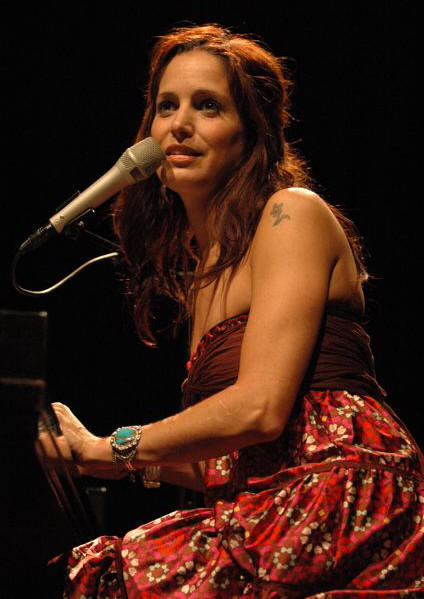 I
really love ďGhosts of You.Ē It is truly haunting. Do you feel that the
lyrics of a song dictate the atmosphere?
I
really love ďGhosts of You.Ē It is truly haunting. Do you feel that the
lyrics of a song dictate the atmosphere?
Oh, absolutely! Oh my God, thatís the key thing with me. I
canít deal with them not sounding like they match. Iíve tried that a bit
more. I have to start trying to match.
(laughs)
Thatís one of my next goals Ė to let that hang a bit more, because Iím so
about the lyric and the melodies matching. So is Raine. This next record,
when we make it, I want to try to bring that down a little bit.
I saw on your website that you were starting a new CD. Are
you working on it yet?
It has. Yes.
How is
it coming along? I know youíre still in the early phases.
Itís just one song. But Iím so excited about it. Iím so
excited to get into the studio and start working again. Itís really
exciting.
Ghost Stories
is
your first CD for Nettwerk, which while it is certainly a well-established
label, it is more of an indie than Sony was. How was the experience of
recording on a smaller label different?
Well, Iíve got to be honest with you Ė itís far more
organic. It can be tough, but itís really rewarding to see people coming
out of the woodwork because they genuinely love the music. People fighting
for the music. Just caring. I feel like at this level I get to be far more
in touch with people genuinely falling in love with my music, as opposed to
questioning. Like, ďIs this going to get out of the scene?Ē Really get
pumped out there and marketed. Itís a very organic kind of feel. I really
like it a lot.
In a
bit of a surprise twist, you have hit the point that you may be as well
known for songs you have written for other artists than ones you have
recorded yourself. You have (and often Raine) had songs recorded by or
co-wrote songs with Gwen Stefani, Avril Lavigne, Kelly Clarkson, Mandy
Moore, Hilary Duff, Cheyenne Kimball, The Veronicas and more? How did this
dimension of your career come about, and is it a little bittersweet when a
song you wrote becomes big for someone else? Do you ever think, oh, man, I
should have held on to that one.
No. I mean sometimes I want their career, for different
reasons. Like, you know; the Mandy Moore thing. Yeah, I wrote a great song
with her and sometimes Iíll have to go
ugh! Thatís frustrating because she instantly
gets way more hits or interviews or I donít know. Thatís hard. Thatís
hard; Iím not going to lie, you know? I am a musician and Iím a freaking
great musician. Iím accomplished and Iíve been around a long time and all
that stuff. But, you know, thatís not who I am. Thatís not the deck of
cards that I was dealt. So Iíve got to suck it up. Thatís it. Sheís
fighting for what she wants. I hope she gets it. I hope everybody gets
what they want. I would never want to take that away from someone at the
same time. Itís an honorable sort of thing.
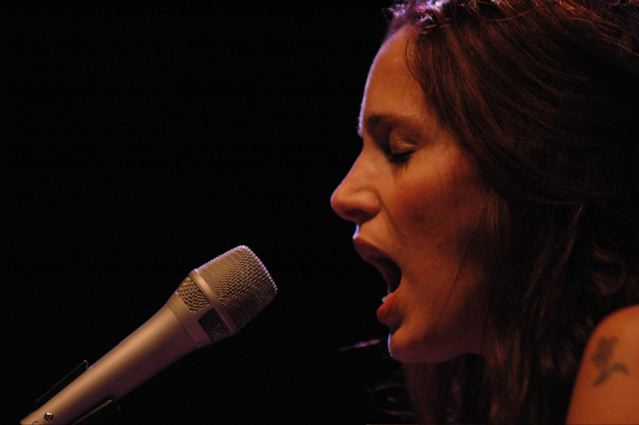 For an
artist who is known so much as a songwriter, it is kind of weird that two of
the recordings youíve done that have been heard by more people were written
by John Denver and Randy Newman.
For an
artist who is known so much as a songwriter, it is kind of weird that two of
the recordings youíve done that have been heard by more people were written
by John Denver and Randy Newman.
Yeah, thatís funny, isnít it?
How do
you pick covers and are they easier or harder than your own songs?
I will say that sometimes thatís frustrating. But then of
course I see how my songs climbÖ I see how both of those songs have
licenses, so thatís encouraging to me that itís not just about the way that
I cover. Having said that Ė when you have successful covers, Iím getting
old enough to realize that that is a privilege. Thatís lightning striking
and it doesnít happen twice usually. I think Iíve had moments where Iíve
been; ugh, another ďFeels Like HomeĒ request for me to go to the Bahamas for
Entertainment
Tonight to be the
wedding singer lady.
(laughs)
There are always these cheesy things attached to ďFeels Like Home,Ē but
there have been amazing opportunities that have come with ďFeels Like HomeĒ
and ďLeaving On a Jet Plane.Ē I think that Iíve ultimately probably had so
much exposure as a result of them, so I canít be anything but really proud
and grateful, quite honestly.
You said earlier that you would sort of like Mandy Mooreís
career. I have heard youíve also done some acting, in
Century Hotel and the short ďPretty
Broken.Ē Is acting a path youíd like to follow more?
I donít want to be an actor, you know what I mean? I donít
want the life of an actor. Iíve wanted to do things that are either
extremely convenient or extremely inspiring (laughs), because Iím
not willing to go for the auditions, at all. It would have to be
because a friend asks me to participate in something. Iím not willing to
lead the life of an actor to where I would do this role, because it will
prepare me for the possibility of getting a role like thatÖ Thatís not
going to happen. For that reason, I know Iím not an actor. If I was
that devoted, I would have tried to pursue and Iím not. The thing that
happens with music is so beautiful in my opinion because it comes from
yourself. You have control over the sound of it. You have control over the
words that youíre saying. If you donít want to do a cover, you donít have
to. You can write your own frickiní song. Whereas, when youíre acting Ė
unless itís something youíve written or youíre so phenomenally inspired by Ė
if thatís your job, youíve got to get up, you have to say the words and
believe the words. Usually lie (laughs). About someone elseís words
and inspirations. I can tell you this, I just donít believe that Jennifer
Lopez felt like Maid in Manhattan was the pinnacle, inspiring role
for her. Iím not willing to do that. But Iím also not willing to take my
clothes off and be a stripper to sing, either. So, there are compromises to
everything.
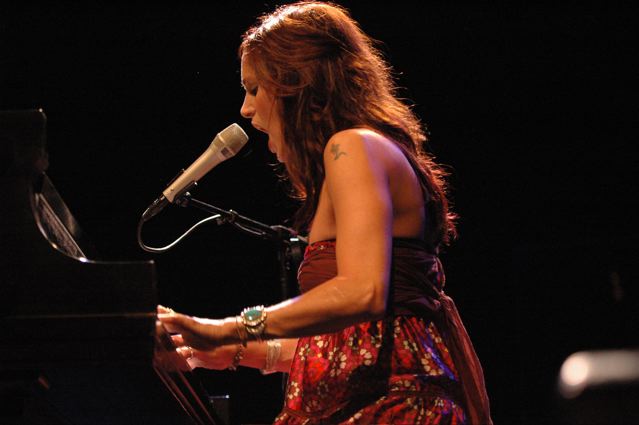 Radio
playlists are so regimented these days. When we were younger, you used to
be able to hear rock, pop, country and soul on the same station, and that
just doesn't happen anymore. Do you think that can make it tougher for an
artist to find an audience?
Radio
playlists are so regimented these days. When we were younger, you used to
be able to hear rock, pop, country and soul on the same station, and that
just doesn't happen anymore. Do you think that can make it tougher for an
artist to find an audience?
Itís weird. I hear people saying things to me like, ďThe
problem is also that you had three albums outÖíĒ Iím like, what the fuck
does that have to do with anything? An honest, beautiful song that touches
people is an honest, beautiful song that touches people. I donít understand
what the difference is. But, hey, you know, quite frankly Iíve become more
and more indie in my beliefs. What I mean by that is if Iím to interpret
what being an artist is, itís essentially buying into yourself. Believing
what you do and sticking to that, no matter what. So I just do my thing and
hey, if one day the world wants to buy it, great. If not and I have
semi-interest records, thatís fine too. I canít just tinker my life to make
those kind of predictions. I canít look at myself like that. I canít do
it.
I remember when I was in college, I had a writing professor
who told the class that if you felt inspiration, you should lie down and
wait for it to go away. I always thought that was a really horrible
attitude. What are your feelings on inspiration? Does it drive your
songwriting?
No, because you can think youíre so fucking inspired and then
youíre not, you know what I mean? Like the other day I had this idea to
write a song for my husband. It was quite poignant to what I thought of him
at the moment. I had to try and do it and it stunk. I didnít get to do
what I wanted to do, which was surprise him with it and sing it at our bigÖ
we were playing together. The idea was romantic and I was inspired. But
the developed idea that came out absolutely reeked. (laughs) Then
Iíve also sat down and not known what was going to come out. Iíve gone in
the shower, not even thinking that I was even a musician, you know, and left
with the biggest song of my career. That was my song ďSurrounded,Ē that got
me signed. It was written in two seconds. That was about something
extremely Ė one of the biggest things that happened to me in my life Ė which
was my college crush shot and killed himself. Iíve ached about that my
whole life. But I have this song that I wrote and Iíve never been the same
since I wrote the song. If the songís written, everything is okay for me.
Like I have that song, I connect with him every night when I sing and we
check in with each other. That song got me my life. Got me my career.
God, if thatís not inspired; I donít know what the hell is. And the song
has touched so many people Ė so many people who have been affected by
crisis. I get those letters. Itís an inspired piece and I did not plan to
write it.
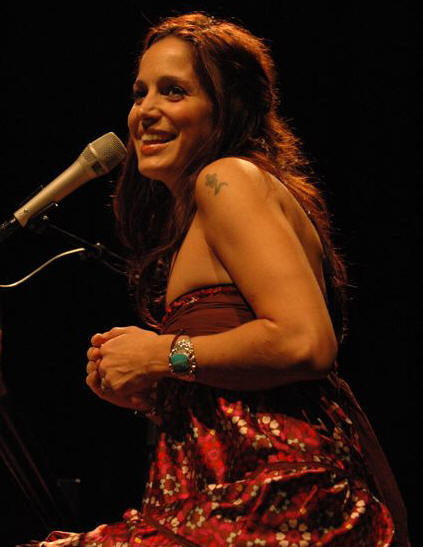 People come to me all the time, Jay, and they say ďhow do you
this?Ē and ďhow do you that?Ē You know what I say? I say I donít know. I
say I donít know. You know what? No one ever gave me anything. I paid on
some level for everything that I got. I donít mean like paid in currency.
Iím such an honest person that way. Iím the kind of person thatÖ I canít
owe anybody anything. I canít owe people money. So I didnít get anything
for free. Even the freaking guyÖ I found out later, I thought was giving me
some studio time, he still has a piece on my freakiní record. On my first I
think one or two records. I didnít know I was signing that away, because I
was too young and the person who was quote-unquote helping me didnít really
let me in on that part. He probably realized that if I knew that I wouldnít
have signed it. You know, I never got anything for free. I never had the
self-worth or the entitlement to think I could get anything for free. I get
a note from a girl yesterday, sheís like fourteen or whatever and she said,
ďHow do you know when itís the right time to do a demo?Ē I wrote back to
her and said only you know that. You put a demo out, whatís the demo for?
Is the demo for you to suddenly have a record deal? Is the demo for you to
see how your voice sounds when you press play? And, by the way, if itís for
you to see what the world thinks of you, be prepared for what they say.
They might say that you suck. They also might say that youíre incredible.
You have to be prepared, at the age of fourteen, to take on that response
from the world. So I said I made my demo tape when I knew what the world
was going to say. I knew what the world was going to say about me. I knew
in my heart. I made my demo tape when I was ready for what the world was
going to say. Does that mean itís right for you? I donít know.
(laughs) Everybodyís so different. If you took ten people who have
successful careers Ė in any career Ė and you ask them, ďWhat happened to
you?Ē ďWhat happened to you? You? You? You?Ē Every answer would be
different.
People come to me all the time, Jay, and they say ďhow do you
this?Ē and ďhow do you that?Ē You know what I say? I say I donít know. I
say I donít know. You know what? No one ever gave me anything. I paid on
some level for everything that I got. I donít mean like paid in currency.
Iím such an honest person that way. Iím the kind of person thatÖ I canít
owe anybody anything. I canít owe people money. So I didnít get anything
for free. Even the freaking guyÖ I found out later, I thought was giving me
some studio time, he still has a piece on my freakiní record. On my first I
think one or two records. I didnít know I was signing that away, because I
was too young and the person who was quote-unquote helping me didnít really
let me in on that part. He probably realized that if I knew that I wouldnít
have signed it. You know, I never got anything for free. I never had the
self-worth or the entitlement to think I could get anything for free. I get
a note from a girl yesterday, sheís like fourteen or whatever and she said,
ďHow do you know when itís the right time to do a demo?Ē I wrote back to
her and said only you know that. You put a demo out, whatís the demo for?
Is the demo for you to suddenly have a record deal? Is the demo for you to
see how your voice sounds when you press play? And, by the way, if itís for
you to see what the world thinks of you, be prepared for what they say.
They might say that you suck. They also might say that youíre incredible.
You have to be prepared, at the age of fourteen, to take on that response
from the world. So I said I made my demo tape when I knew what the world
was going to say. I knew what the world was going to say about me. I knew
in my heart. I made my demo tape when I was ready for what the world was
going to say. Does that mean itís right for you? I donít know.
(laughs) Everybodyís so different. If you took ten people who have
successful careers Ė in any career Ė and you ask them, ďWhat happened to
you?Ē ďWhat happened to you? You? You? You?Ē Every answer would be
different.
Itís true, Iíve had two books published and Iíve done it so far away from
the way that everyone said; in order to do publishing you have to do this
and this and this. It happened nothing like thatÖ
I donít buy into this Tony Roberts thing or the Lee Iacocca
story. I didnít read the book. Iím so naÔve, in my head I thought you sent
a song to a record company. I thought that if the record company liked it,
they would give you a record deal. Thatís what I thought happened. And so,
thatís what I did. But that doesnít mean that thatís the way it works.
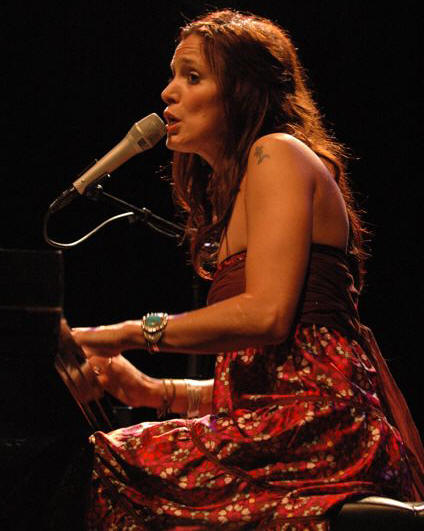 In the end, how would you like people to see your career?
In the end, how would you like people to see your career?
You know, I get notes now from people Ė and thatís just
because Iím 34 and Iíve been around long enough, I donít know what the deal
is Ė but I get note from people and they say, ďChantal, thank you for
staying true to yourself.Ē I get notes from women that say, ďThank you for
not compromising yourself as a woman.Ē That means a lot to me. I also get
notes from guys who say, ďYouíre pretty cool. Like, youíre not a stripper
and youíre notÖ I actually hate to say it but youíre a pretty cool chick.
You have integrity.Ē There are moments where I feel like, yeah, I could be
the one with all the fame and all the fortune Ė but I was never ambitious
enough to where I wanted to compromise myself; in what I say, in my words,
in my melodies, in my lyrics, in my actions. I was never prepared to
compromise that. I just canít fake that. I canít fake it. Iím not that
hungry. I think I would starve before I would compromise that. For some
reason, I donít know if itís the way I was raised.
I feel so lucky. I want to respect myself. Thatís what I
want. Quite honestly, thatís more important to me than what other people
say about me. Itís really nothing to do with anyone else, actually
(laughs) now that I articulate these emotions. Itís really about Ė I
love being me. When I wake up in the morning and I look in the mirror.
When I go downstairs and Iím with my children. When Iím with my husband.
When Iím with my parents. When Iím with my friends, my neighbors. When I
walk on stage. Eating a piece of carrot cake, like I did the other day. I
just want to be myself. I donít want to wear so many hats. Iím already
maxed out, you know? Life to me is a lot of roles. Iíve been given a lot
of roles in my life. Iím a humanitarian. I have a lot of responsibilities
in my personal life. Some very personal. I have callings in the mental
health community and work with kids, conflict kids, outreach kids. A lot of
areas in the world that I feel obliged to step up. I donít think I can be
that flashy chick. So I would say thatís not only how I would want people
to remember me, but thatís how they are going to. Thatís not going to
change. Thatís just the way itís going to be.
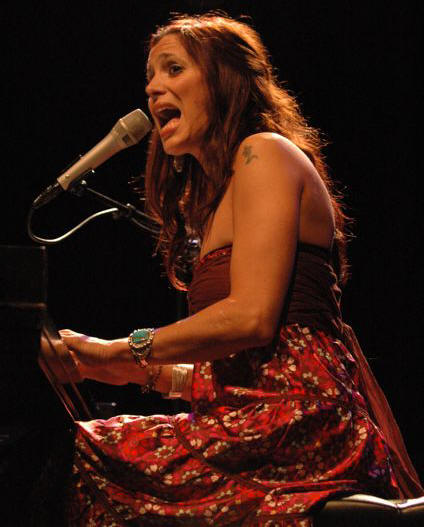 Are there any misconceptions you'd like to clear up?
Are there any misconceptions you'd like to clear up?
Oh, manÖ. Yeah, Iím sure there are. Iíll tell you, Iím
someone who cares a lot, you know? I care a lot about people and being a
compassionate person is one of my greatest goals. Itís just the way it is
for me. I donít like to judge other people. I feel that until Iíve walked
a few miles in other peopleís shoes, itís not ever fair for me to judge
anyone. I love to help people. I feel for people. Iíve had a life that
has led me to the privilege of being able to care about people. You know,
there are always people who say things that are hurtful. Iím not going to
deny it, it sometimes Ė maybe Iíve always been only given a certain level of
fame ands scrutiny because itís the amount I can handle. I ache sometimes
from things people will say. I never seem to like the word jealousy orÖ I
donít like the thought of someone else being a jealous person. I will say
that it is hard sometimes to hear negative things people say. But, I think
itís just part of life, and Iím going to have to teach my children about
that, so Iím getting stronger and stronger with that every day. Itís not
such a profound thing to where I ever lose sleep over it, quite frankly, but
it always feels like a ugghhhh! Like a stab. (laughs)
I always say that I wish that I could crack open my sternum
and show you my heart. You would know thatís the wrong person to ever even
thinkÖ I just donít have an ounce ofÖ I donít have malicious. I would help
any person that I could on this planet. To a fault, I mean. Iím
a sucker, manÖ. Iím a sucker for love. So, that would be the only thing in
my life. Regardless of fame or my music career or anything like that.
Thatís the only thing that I would ever say about life that is hard for me Ė
because I really feel blessed. I really feel that God game me a lot of love
and compassion. It can be a bit of a curse, I guess. You know, when you
put yourself out there Ė Iím going to have to teach my kids about that Ė
when you put yourself out there in the world itís a bold move, you know?
Sometimes youíve just got to be a little bit dumb and in order to have thick
skin. I almost think you have to play a little dumb, you know?
My husband teaches me so much every day.
He says if you donít want to feel the bad review; donít read the good ones
or the bad ones. Donít think you can read the good ones.
I feel sorry for these young starlets who make all their
decisions where everything is just based on this career perception. Then
they become sort of bankrupt in the other areas of their life. It does
eventually catch up to them, but then itís too late because theyíve missed
that learning window that is so important.
Email
us Let us know what you
think.
Features
Return to the features page.